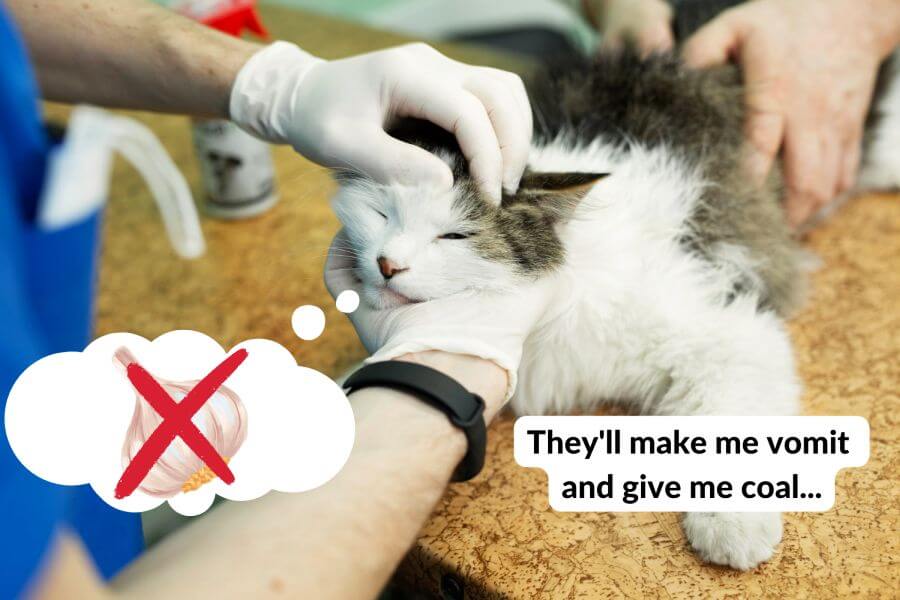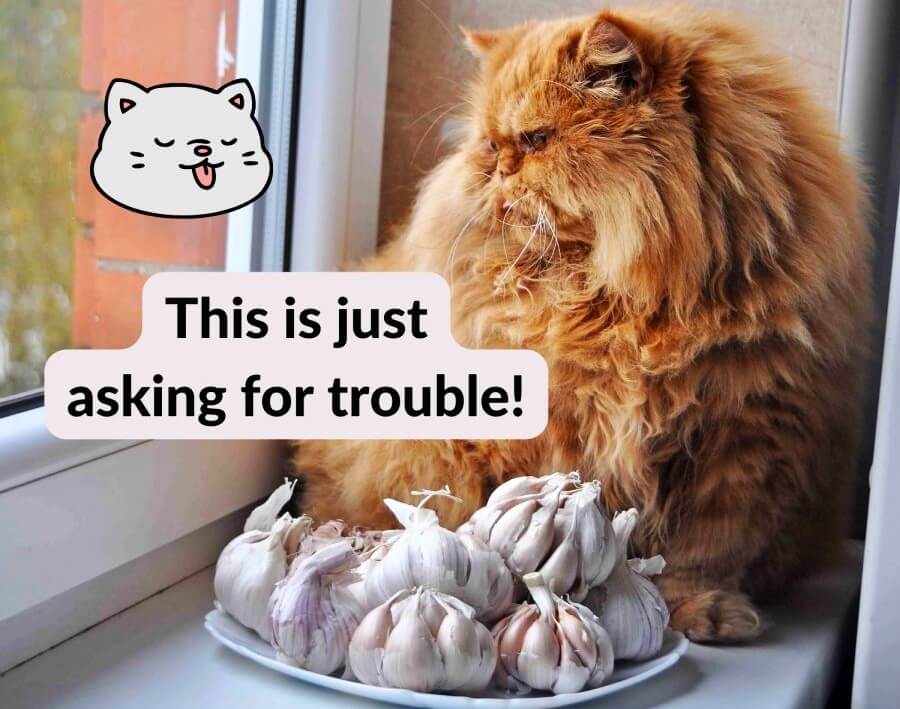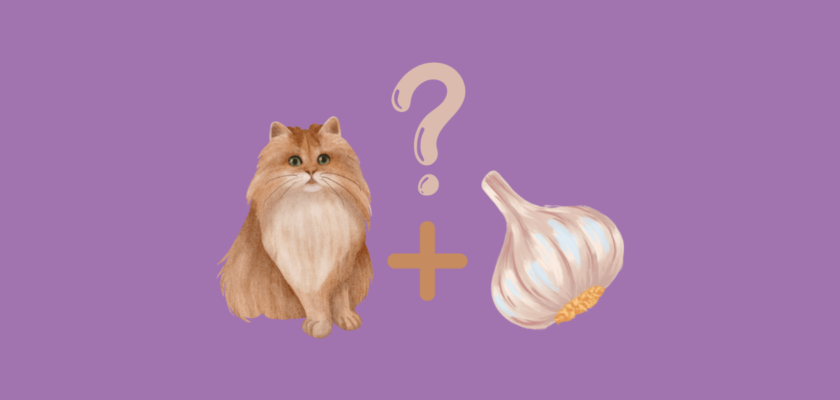Long Story Short
- Garlic (and anything that contains it) is dangerous for cats 🙀
- It contains N-propyl disulfide, a toxin that causes anemia in cats ❌
- Early symptoms of garlic toxicity: throwing up, depression, and loss of appetite 😿
- A chomped-down garlic means a vet trip for the kitty 👨⚕️
Can Cats Eat Garlic?
Can cats eat garlic? Hold your whiskers, furry friend! Garlic is a big no-no for cats (and dogs too). Here’s why: garlic contains a sneaky compound called N-propyl disulfide, which can be toxic for our four-legged companions. Even a small amount won’t do them much harm, but why risk it? It’s best to keep the garlic goodies far away from their whiskers.
Some people also believe that garlic can be used to get rid of fleas in dogs and cats. This is a myth – here’s an explanation.
Our Reader’s Story 🧄
My neighbor’s cat loves playing with garlic cloves. I was worried when I first saw it, and I told my neighbor that one day, the cat might eat the garlic out of curiosity. He told me that she’s been playing with garlic cloves for years, and never once has he noticed any difference in her health. Then, right in front of us, the kitty bit into the clove she was playing with and started chewing it. My neighbor was shocked and quickly took it away from her – cosmic karma, amirite?!
What Is Garlic Poisoning?
Now, let’s dive into the consequences of garlic consumption for our feline buddies. Just a tiny ounce of garlic can wreak havoc on an adult cat’s delicate red blood cells. Yikes!
Can cats eat garlic and be treated successfully? Yes… but it’s not always easy. Just look at the symptoms our furballs can experience:
- pale gums;
- increased heart rate;
- difficulty breathing;
- drooling;
- weakness;
- depression;
- inability to move.
Garlic and Onion Poisoning in Cats – Treatment
If garlic slips past your ninja skills and your kitty consumes more than a sprinkle, buckle up for potential trouble. Garlic toxicity symptoms in cats might include an unwelcome parade of vomiting, lethargy, and loss of appetite. It’s a worrisome sight, but fret not! Veterinary help to the rescue! Quick treatment, like providing fluids, electrolytes, and even activated charcoal, can help your furry buddy bounce back like a champion. Trust me, most cats are experts at staging a full recovery with the right care.

Hemolytic Anemia in Cats
Listen up, folks! When it comes to cats, garlic’s got a sinister side. It can trigger a devilish condition called anemia, where those precious red blood cells take a nosedive. And trust us, that’s no purr-ty sight! Anemia can bring a bunch of health issues to your feline companion’s doorstep, from tummy troubles like diarrhea to feeling as weak as a soggy noodle. Worst-case scenario? It can even lead to the unthinkable – yes, we’re talking about the dreaded “D” word: death.
Bluish gums, lethargy, and throwing up – these are the worrying signs. No time to waste: get your kitty some treatment!
How to Keep Your Kitchen Safe for Cats
Not only cloves of garlic are toxic for cats. Onions, leeks, chives, and shallots are all dangerous for them. See any pet brands advocating for it? Run! Now, instead of garlic, you might see herbs, like parsley, basil, or thyme. These are the acceptable ones.
For all goodness sake, keep garlic out of reach of cats. Your spices (most importantly, garlic powder)? In a cabinet! Garlic bread? Secured! There is no antidote for Allium toxins. Garlic for cats is really not worth the trouble.
Can cats eat garlic? Now you know it’s not just bad, it’s AWFUL to them.

Frequently Asked Questions
What Happens If a Cat Eats a Little Garlic?
A small amount of garlic can result in some mild symptoms, such as vomiting and lethargy. But anything over half an ounce of garlic is a problem.
How Much Garlic Is Toxic to Cats?
Studies show that anything more than 5 grams per kilogram of body weight can be severely toxic to felines. The average cat weighs 4.5 kilograms, which is about 10 pounds. 5 g is about 0.18 oz. So, about 0.8 oz (one garlic clove) is a highly toxic dose for the average cat.
Can Cats Eat Meat Cooked With Garlic?
No, cats should not eat meat cooked with garlic or any related vegetable.
Similar Posts:
- Can Dogs Eat Onions?
- Can Dogs Eat Garlic Bread? Is Garlic Safe for Dogs?
- Can Cats Eat Onions and Chives? Let’s Unleash the Truth!
- Can Cats Eat Grapes and Raisins? Are They Poisonous?
- Can Dogs Eat Ketchup? Is Tomato Sauce Bad for Dogs?
- Can Dogs Eat Hummus? It’s Not Just Chickpeas
- Why Is My Dog Throwing Up Blood? Blood in a Dog’s Vomit
- Can Cats Eat Bread? Choose the Best Diet for Your Feline Friend!

